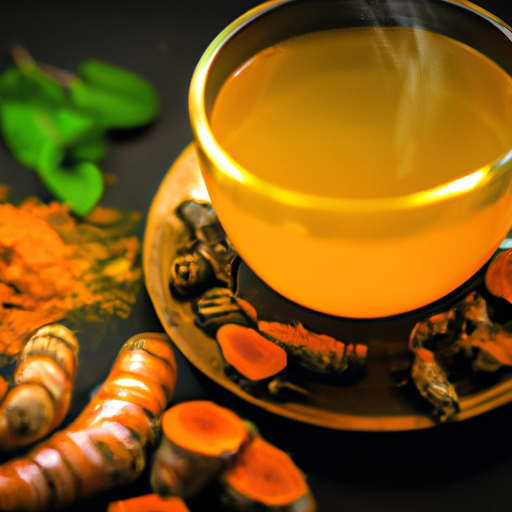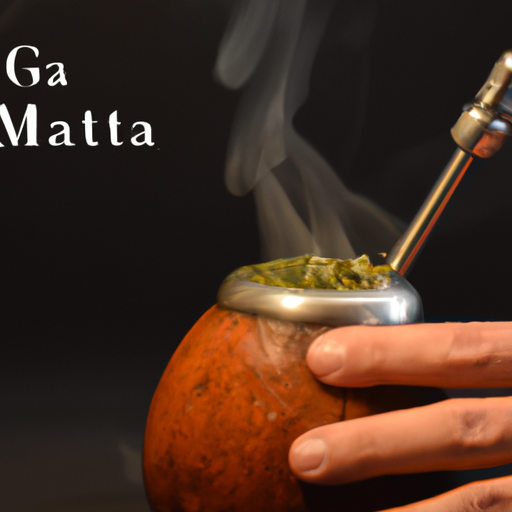I’ve always had a deep interest in the effectiveness of natural cures, and turmeric tops my list. This bright-hued spice boasts a long history in both traditional healing practices and culinary uses, celebrated for its ability to reduce inflammation and its potent taste. However, are you familiar with the concept of turmeric tea?
Turmeric tea is a delicious and healthful way to incorporate this wonder spice into your daily routine. Made from brewed fresh or dried turmeric root, this warm beverage has a bright yellow hue and a slightly bitter taste that can be tempered with sweeteners like honey or agave syrup.
In this article, we’ll explore the history, benefits, recipes, and potential side effects of turmeric tea so you can decide if it’s right for you.
Key Takeaways
- Turmeric tea is a natural remedy with anti-inflammatory properties and cultural significance.
- Drinking turmeric tea regularly may boost the immune system, aid digestion, and prevent chronic diseases.
- Fresh and high-quality ingredients, along with proper preparation, are important for making the perfect cup of turmeric tea.
- Turmeric tea can aid in weight loss, improve cognitive function and mood, reduce joint pain and depression symptoms, and offer various other health benefits.
History and Origins of Turmeric Tea
If you’re a tea lover, did you know that turmeric tea has been enjoyed for centuries in India and other parts of the world? Turmeric tea history dates back to ancient times when it was used as a medicinal herb.
In Ayurvedic medicine, turmeric is known for its potent anti-inflammatory properties and has been used to treat various ailments such as digestive issues, skin problems, and even cancer. Apart from its medicinal properties, turmeric tea also holds cultural significance.
It is an essential part of Indian culture and is consumed during festivals and special occasions. Turmeric tea is also considered a traditional remedy for colds and flu in many parts of the world. The tea’s yellow color comes from the curcumin compound found in turmeric, which gives it a distinct flavor that sets it apart from other teas.
With its rich history and traditional uses, it’s no wonder that turmeric tea continues to be popular today. But perhaps more than just cultural significance, modern research has shown that this beverage packs quite a nutritional punch.
So if you’re looking for an easy way to boost your health naturally, read on to learn about the nutritional benefits of turmeric tea!
Nutritional Benefits of Turmeric Tea
You can reap a multitude of health benefits by incorporating this vibrant yellow spice into your daily routine. Turmeric tea is known for its numerous nutritional properties that can help improve your overall well-being.
One of the most significant benefits of turmeric tea is its anti-inflammatory properties. Curcumin, the active compound in turmeric, has been shown to reduce inflammation in the body and may help alleviate symptoms associated with conditions such as arthritis.
Turmeric tea recipes are easy to make and can be customized according to your preferences. You can add other ingredients like ginger, honey, or lemon juice to enhance the flavor profile of your drink.
Drinking turmeric tea regularly may also boost your immune system and aid digestion. If you’re looking for a natural way to improve your health and wellness, then turmeric tea might just be what you need!
Learning how to make turmeric tea is simple – all you need is some fresh or ground turmeric, water, and optional add-ins such as cinnamon or black pepper. So why not try adding this delicious drink to your daily routine? It’s a great way to stay healthy while enjoying a tasty beverage!
How to Make Turmeric Tea
Get ready to savor a warm and soothing drink that can improve your health – making turmeric tea is quick and easy! This flavorful beverage has been cherished for centuries due to its numerous benefits.
Turmeric contains curcumin, a compound known for its anti-inflammatory properties. By drinking turmeric tea, you may help prevent chronic diseases such as heart disease, Alzheimer’s, and cancer.
There are various recipes available for making turmeric tea at home. One recipe involves boiling water with freshly grated or powdered turmeric root. You may also add other ingredients such as ginger, cinnamon, lemon juice, honey or black pepper to enhance the flavor and nutritional benefits of the tea.
Another recipe involves using coconut milk instead of water to create a creamy beverage that is perfect for cold winter days.
To make the perfect cup of turmeric tea, it’s important to use fresh and high-quality ingredients. Choose organic turmeric root whenever possible as it is free from harmful pesticides and chemicals. Moreover, adding black pepper increases the bioavailability of curcumin in your body by 2000%. So don’t forget to sprinkle some black pepper into your cup of golden goodness!
Tips for Making the Perfect Cup of Turmeric Tea
For a truly satisfying cup of this warm and fragrant brew, start by selecting only the freshest organic ingredients. Turmeric tea is simple to make, but requires attention to detail in order to achieve the perfect balance of flavors. Here are some tips for making a cup that you’ll love:
| Tip | Explanation |
|---|---|
| Use fresh turmeric root | Powdered turmeric can be used in a pinch, but for the best flavor, use fresh turmeric root. Look for roots that are firm and brightly colored with no signs of mold or decay. |
| Add black pepper | Black pepper contains piperine which enhances the bioavailability of curcumin, the active ingredient in turmeric responsible for its health benefits. Aim for 1/4 teaspoon of black pepper per 1 teaspoon of turmeric powder or grated fresh turmeric root. |
| Simmer gently | Boiling or overheating turmeric can result in a bitter taste and loss of potency. Instead, simmer gently over low heat for at least 10-15 minutes to release all the beneficial compounds from the spices. |
| Sweeten to taste | Turmeric tea has a slightly bitter taste that can be counteracted with natural sweeteners like honey, maple syrup or stevia. |
Daily consumption of Turmeric Tea offers numerous health benefits such as reducing inflammation, aiding digestion and promoting heart health among others. With these tips in mind you can easily incorporate it into your daily routine while enjoying its delicious taste and nutritional value.
Incorporating variations into your regular routine adds variety while providing additional health benefits. Try adding ginger or lemon juice for extra flavor or coconut milk instead of regular milk if you prefer dairy-free alternatives. Experimenting with different recipes will help you find your perfect cup!
Variations of Turmeric Tea
Adding a dash of cinnamon or nutmeg can add a cozy and warming flavor to your daily cup of this golden elixir. Turmeric tea is not only delicious but also has numerous health benefits that make it a popular beverage choice. With its anti-inflammatory properties, turmeric tea is known to boost immunity and improve digestion.
There are many variations of turmeric tea that you can try at home, each with its unique flavor combinations. Here are some ideas to get you started:
- Ginger and lemon: Adding ginger and lemon to your turmeric tea not only enhances the taste but also boosts your immune system.
- Honey and black pepper: A pinch of black pepper combined with honey will give your turmeric tea a punchy, sweet flavor while also increasing the bioavailability of curcumin in turmeric.
- Coconut milk: Mixing coconut milk into your turmeric tea creates a creamy, tropical twist on this classic drink.
- Green tea: Combining green tea with turmeric adds an extra antioxidant boost to help fight inflammation.
Incorporating these flavor combinations into your daily routine can make drinking turmeric tea even more enjoyable while providing additional health benefits. As we move onto discussing the best time to drink turmeric tea, remember that there are no set rules – simply find what works for you!
Best Time to Drink Turmeric Tea
The optimal time to enjoy this golden elixir is in the morning, as studies have shown that consuming a turmeric-infused beverage can enhance cognitive function and improve mood. Drinking turmeric tea early in the day can also help kickstart your metabolism and promote overall digestive health. However, if you’re sensitive to caffeine, it may be best to consume turmeric tea later in the day or during meal times.
While drinking turmeric tea before bed may seem like a good idea for its potential calming effects, it may actually disrupt your sleep due to its stimulating properties. Additionally, drinking turmeric tea with meals can aid in digestion and absorption of nutrients.
It’s important to note that while turmeric has numerous benefits, overconsumption can lead to negative side effects such as stomach upset and nausea. Incorporating turmeric tea into your daily routine can be easy and enjoyable. Try replacing your morning coffee or afternoon snack with a cup of freshly brewed turmeric tea. You can even experiment with adding honey or ginger for added flavor and health benefits.
As with any new addition to your diet, it’s best to start slow and gradually increase consumption while monitoring how your body reacts. And remember, moderation is key when it comes to reaping the benefits of this powerful spice! Moving on from here, let’s discuss some potential side effects of drinking too much turmeric tea.
Potential Side Effects of Turmeric Tea
Drinking too much of this golden elixir may have some unexpected consequences, so it’s important to be aware of the potential side effects. While turmeric tea is generally considered safe for consumption, there are possible risks and precautions to consider.
One of the most common side effects is gastrointestinal distress, such as bloating, gas, and diarrhea. This is especially true for those who consume large amounts or have a sensitivity to spices.
Another potential side effect of turmeric tea is that it can interact with certain medications. For example, if you’re taking blood thinners like warfarin or aspirin, consuming high doses of turmeric could increase your risk of bleeding and bruising. Additionally, if you’re on medication for diabetes or high blood pressure, turmeric may affect your blood sugar levels and blood pressure readings.
When drinking turmeric tea, it’s essential to take these possible risks into account and speak with your doctor about any concerns you may have. By doing so and being cautious with dosage sizes (1-2 teaspoons per day), you’ll be able to safely enjoy the benefits this spice has to offer without experiencing any adverse effects.
Now let’s talk about how turmeric tea can aid in weight loss without having to go on a strict diet or exercise regimen!
Turmeric Tea and Weight Loss
While turmeric tea may have some potential side effects, it does offer several health benefits. One of the most popular uses for turmeric tea is weight loss. Many people claim that drinking turmeric tea helps promote weight loss and aids in fat burning.
Turmeric contains a chemical called curcumin, which has been shown to have anti-inflammatory properties. Inflammation can cause weight gain and lead to conditions such as diabetes. Drinking turmeric tea regularly may help reduce inflammation in the body and improve insulin sensitivity, making it an excellent choice for those with diabetes.
In addition to its anti-inflammatory properties, turmeric has also been shown to boost metabolism and aid in digestion. Here are three ways that adding turmeric tea to your diet can help with weight loss:
- Turmeric can increase thermogenesis, which is the process by which your body burns calories.
- Turmeric can improve digestion by stimulating bile production.
- Turmeric can reduce cravings and hunger pangs by regulating blood sugar levels.
Overall, incorporating turmeric tea into your daily routine may be helpful if you’re looking to lose weight or improve your overall health. Not only does it have anti-inflammatory properties that may benefit those with conditions like diabetes, but it can also boost metabolism and aid in digestion.
As we move on to other uses of turmeric, keep in mind how versatile this spice truly is when it comes to improving our health.
Other Uses of Turmeric
If you’re looking for other ways to incorporate this versatile spice into your diet, there’s no shortage of options. Remember, variety is the spice of life! Turmeric has been used for centuries in Ayurvedic medicine and traditional Chinese medicine. Its anti-inflammatory properties have been known to help alleviate joint pain and even reduce depression symptoms.
But did you know that turmeric can also be used in skincare? Its antioxidant properties make it a great ingredient for reducing signs of aging such as wrinkles and age spots. You can easily make a DIY face mask by mixing turmeric with honey or yogurt to create a soothing and nourishing blend.
In addition to its health benefits and use in skincare, turmeric can also be used as a natural dye for fabrics. The vibrant yellow color of the spice makes it perfect for creating unique designs on clothing or home decor items. Simply mix turmeric powder with water and vinegar to create a dye bath, then soak your fabric until the desired shade is achieved.
It’s an eco-friendly alternative to synthetic dyes that often contain harmful chemicals.
Frequently Asked Questions
Can turmeric tea be consumed by pregnant women?
As a pregnant woman, it’s important to be careful about what you consume. Turmeric tea can have health benefits, but it may not be compatible with pregnancy. Some studies suggest that turmeric may stimulate the uterus or promote menstruation, which could potentially lead to miscarriage or premature labor. However, more research is needed on this topic.
If you’re pregnant and considering drinking turmeric tea for its anti-inflammatory or antioxidant properties, it’s best to consult with your healthcare provider first to ensure it’s safe for you and your baby.
What is the recommended daily intake of turmeric tea?
When it comes to turmeric tea, the recommended daily intake depends on a variety of factors such as age, weight, and overall health. However, generally speaking, one to two cups per day is considered safe and beneficial for most individuals.
The health benefits of turmeric tea are numerous. From reducing inflammation and improving immune function to lowering cholesterol levels and aiding in digestion, this powerful drink has been used medicinally for centuries.
While it’s important to be mindful of any potential interactions or side effects, incorporating turmeric tea into your daily routine can be a delicious way to support your overall wellness. As the saying goes, "a cup of turmeric tea a day keeps the doctor away"…or at least helps keep your body balanced and healthy.
Can turmeric tea interact with certain medications?
Interactions between turmeric tea and certain medications may occur, making it important to exercise safety precautions and be aware of potential side effects. Turmeric tea can interact with blood thinners such as warfarin or aspirin, increasing the risk of bleeding. It can also interact with drugs that affect the liver, such as statins or chemotherapy drugs.
Those taking medication for diabetes should use caution when consuming turmeric tea as it can lower blood sugar levels. Side effects of turmeric tea may include upset stomach, nausea, dizziness, or diarrhea if consumed in excess. It’s always recommended to consult a doctor before adding any new supplements or herbal remedies to your daily routine to prevent any unwanted interactions or adverse effects.
Does turmeric tea have any impact on cholesterol levels?
Lowering cholesterol levels is crucial for maintaining good heart health, and turmeric tea can help with that. Studies have shown that curcumin, the active ingredient in turmeric, has beneficial effects on cholesterol levels. It reduces LDL (bad) cholesterol and increases HDL (good) cholesterol. This means that incorporating turmeric tea into your daily routine could potentially lower your risk of heart disease and stroke.
However, it’s important to note that while turmeric tea can be a helpful addition to a healthy lifestyle, it shouldn’t be relied upon as the sole method of managing cholesterol levels. It’s always best to consult with a healthcare provider before making any significant changes to your diet or exercise routine.
Is there a difference in the benefits of consuming fresh turmeric versus turmeric powder in tea?
When it comes to making turmeric tea, there is a difference in the benefits of using fresh turmeric versus turmeric powder. While both options offer health benefits, using fresh turmeric in tea can provide even greater advantages.
Using fresh turmeric for cooking and brewing tea allows you to enjoy all the nutrients and antioxidants present in the root. Fresh turmeric contains high levels of curcumin which is a powerful anti-inflammatory agent that helps fight against free radicals that damage skin cells.
That being said, using powdered form may also be more convenient for some people as it has a longer shelf life than fresh turmeric. Regardless of whether you use fresh or powdered form, incorporating turmeric into your diet through drinking tea can help improve overall skin health by reducing inflammation and promoting cellular repair.
Conclusion
In conclusion, I’m a huge fan of turmeric tea. It’s rich history and numerous nutritional benefits have made it a staple in my daily routine. Plus, it’s easy to make and the variations are endless – from adding honey for sweetness to coconut milk for creaminess.
But before diving headfirst into your cup of turmeric tea, it’s important to be aware of any potential side effects and consult with your healthcare provider if necessary. And while turmeric tea may not be a magic weight loss solution, incorporating it into a healthy lifestyle can certainly aid in achieving overall wellness goals.
Overall, turmeric tea is a delicious and healthful addition to anyone’s diet. So why not try brewing up a cup today? Your taste buds (and body) will thank you!










